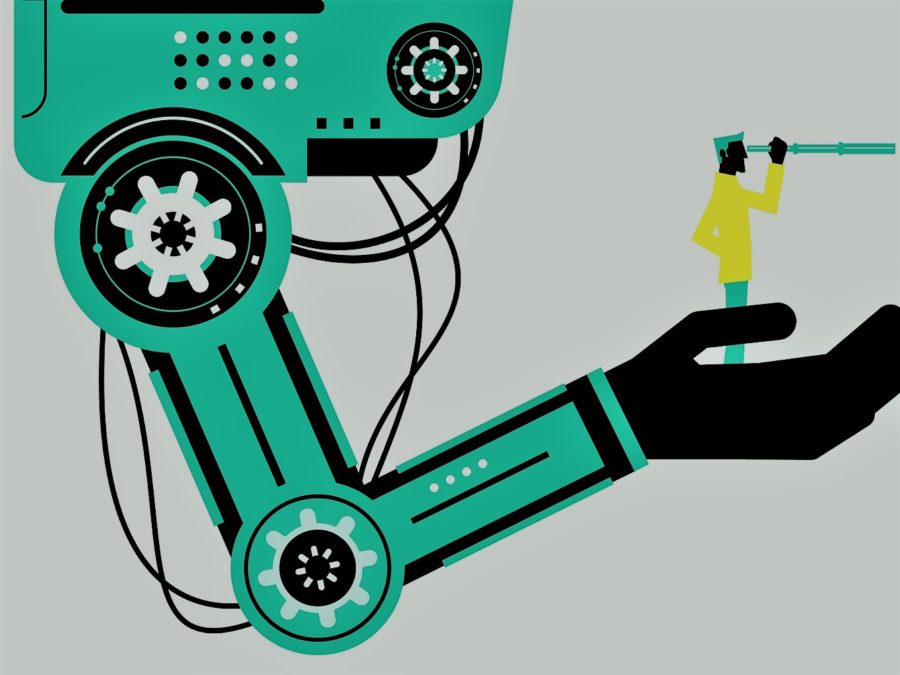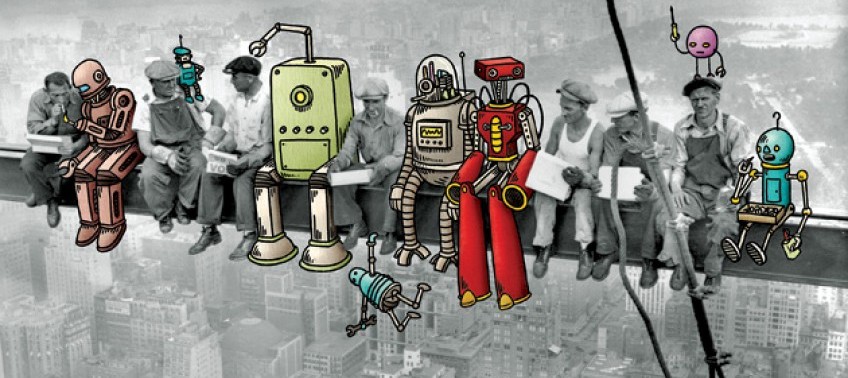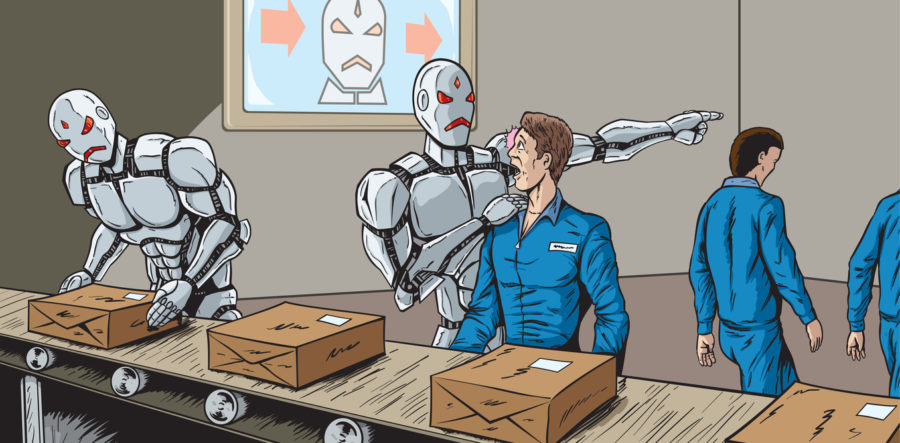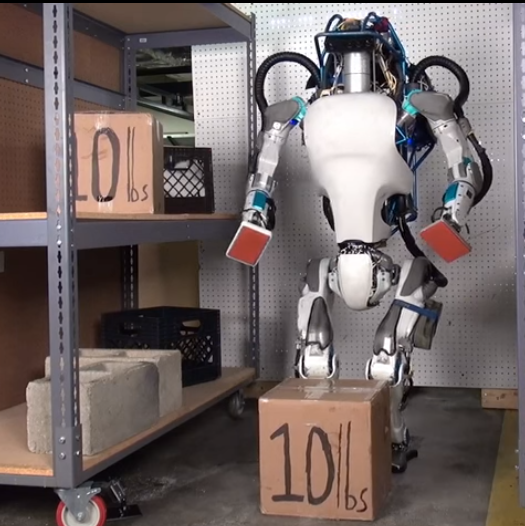I look forward to the day when cars will replace me and my colleagues …

Original material
I'm not one of those people who will keep my job as the widespread automation, which is only gaining momentum. My job is to arrange items on grocery store shelves on night shifts. The future, in which my work will be performed by a machine, is not difficult to imagine, moreover, it is inevitable. It will be performed faster and at a level that no other person can achieve. The thought that some company did not switch to such solutions after the commodification of this technology will become equated with delirium.
I am a wholly and completely unionized employee, to be precise, a member of the food and trade union. I act as a union organizer in my shop, teaching my colleagues about their rights under the law and their contracts. I am proud of this idea. So proud that some people don't like it that I, as a shift senior, don't force people to work late or skip breaks. But I am looking forward to the day when cars will replace me and my colleagues, and I do not think that such a position goes against my progressive values.
As you might expect, my sisters and union brothers have been controversial in this view. At quarterly meetings, they often share worries about self-checkouts, automated price tags, and even giant automated floor cleaning machines that move ominously along the aisles. Although I find them creepy and interfering with the warehousing process, this does not in any way affect my vision of the future.
Consequences of 'unskilled labor'
You've probably heard the term 'unskilled labor' in the context of job descriptions that do not require specific knowledge or training – often involving hard physical work or customer service. I have often seen a very negative reaction to this term on social media, people see the use of the term as a manifestation of class rejection. The debate is that those with access to better – more expensive – education and training consider potentially less privileged people 'inexperienced' regardless of the skills required for these positions.
I agree with the judgment. There is research to support this claim.
In 2013, the journal Personnel Psychology, which publishes research on the psychology of people in the workplace, wrote about the alarming level of emotional self-organization problems in service workers. Subjects who were expected to show feigned emotions to please clients complained of various negative effects ranging from neurasthenia to insomnia.
In a post-study article, HuffPost interviewed Doug Pug, a Virginia Commonwealth University researcher whose work on emotional self-organization was cited in the study. Pug compared the service worker's ability to 'tame' a difficult customer in a friendly manner with the detective's ability to 'use various emotion management strategies to manipulate suspects.' He adds: “Managers can also be aware of the demand for such positions and the skills required for them, which should be paid accordingly.” Of course, the comparison with work in the field of criminal law is an exaggeration, but it is fair to say that such positions significantly influence the psychology of those who occupy them. And the evidence doesn't end there.

You can not write off the physical costs of hard work. No emphasis on safety in the workplace can prevent injury if workers often perform the same tasks, lift weights, and work irregularly. What could be worse? The Occupational Safety and Health Administration estimates that only half of serious work-related injuries are reported. When people run the risk of being interrogated, drug tested and the possibility of losing pay in an already low-paid position, the fear that management will find out about the injury becomes understandable. As a person engaged in rather tedious work, I can say that it is rather difficult to distinguish trauma from ordinary everyday pain.
Some of the more cunning companies apply certain incentives for the number of days without reported injuries, offering small rewards in the form of a party or drawing a gift card when a significant number of days are reached. No matter how anecdotal it may sound, I can confirm all of the above. Both hard physical labor and customer service are involved in my work. I saw people leaving home broken and devastated. I saw those who returned from vacation for health reasons not treated, because they cannot afford not to work and have been looking for an opportunity to work overtime. I saw people crying in the backyard after a fight with a client and then getting ready and going back to the hall. This job is not for people.
The alignment of forces in customer service
Senior administrators, of course, are rewarded for showing customers how to use automatic checkouts, thereby reducing billable 'man-hours'. In particular, in my store, but probably in many similar stores throughout the country and the world, customers often doubt or openly resist this. They declare that they prefer the opportunity to communicate with a living person. The machine cannot give them what a person can – the ability to socialize. Isn't that what we all want?
As barriers fall between buyers, wholesalers and manufacturers, the only advantage showrooms have, beyond quick access to goods, is the human factor. This is the place where people will serve you. This is the price of the service experience, it is the justification for the retail margin. This is the price of leniency. Retailers, through the expected notion of 'the customer is always right', have substantiated and promoted the importance of looking at other people with disdain. There should be no place where anyone thinks they are always right / right.
Similar to how you shouldn't start a relationship at work, this unhealthy balance of power is the reason that the customer service situation is not an opportunity to socialize. You may think of yourself as the ideal pleasant customer, but the employee should always remember that you can suddenly change your mindset and should be ready to 'upset' you at any time. This has already happened to this employee many times.
If you want to communicate, then look for a context in which everyone is equal. My favorite rule of thumb for 'tackling' colleagues was formulated by my favorite podcast writers, the McElroy brothers, to paraphrase: 'Don't trick anyone unless that person can run away from you at full speed. I do not remember, unfortunately, which of the brothers said this, but this rule should be applied in most social situations.

There are exceptions to this rule in small businesses, but such companies are a) less tied to a customer service culture than large companies are led to believe, and b) less likely to switch to automation. Probably, if you do not learn anything for yourself from the rest of this material, then this can be a good reason to get acquainted with the small business around you.
The inevitable end of capitalism
The company I work for has an annual goal of increasing sales by 5% and reducing labor costs by 5%. No special calculations are required to assume that this model fails. Yet it contains the symbolism of all capitalism. The ever-increasing profits, as the main goal of capitalism, require increased sales and reduced costs. One fine moment you will sell everything you can, but you will not have employees left who will re-order the goods and fill the shelves with them.
But this is the reason for the inevitability of automation, no matter how we fight it. Automation is a solution to a dilemma, a way to cut labor costs to zero and still get the job done. As this technology becomes more affordable and widespread, moving away from automation is crazy for any company. And why should we fight for these awful jobs that harm us and prevent us from sleeping? If technology saves us from having to engage in thoughtless activities and disgrace ourselves for the sake of someone's pleasure, then why not embrace it?
I will continue to give my arguments, but you hopefully understand that I am fooling around. I know what you are thinking. Many will lose their jobs, they will be replaced by 'robots'. How will they live?

As I said, automation cannot be stopped, no matter how we protest. Automation is the next step in the evolution of capitalism, and it will come if it doesn't destroy capitalism at all. We can keep wailing, or we can sit down and think a little. With such a large workforce freed up, who will pay for the products that keep these companies afloat?
This is the future into which we are rapidly moving, no matter how dystopian it may look, but there is something to think about. What do we as a nation and how will the world have to reevaluate in this scenario? The solution is to think ahead.
The continuous development of science and technology is an advantage that we should not hold back. Not to preserve some kind of antediluvian economic system. Not to keep jobs that cripple employees and turn clients into monsters. The root of all our economic problems is scarcity. And the only method available to us to combat this limitation is our scientific research. If we don't find a solution, then nothing will save us. Neither automation. Not a job with a beggarly salary that will wear us down to the end. Nothing.
We can predict the future development of this problem and prepare for it by creating an appropriate legislative framework, possibly free education and training, to make 'skilled labor' more affordable or even based on a guaranteed basic income. On the other hand, we can wait for the onset of the crisis and play the government's desperate card as he watches us from the barrel of financial ruin. Given the precedents, the second option is to be expected.
By Mark Thomas McLaughlin
One of the topics that people never tire of discussing, and rightly so. I cannot but support the author in terms of facilitating the life of people employed in completely inhuman positions by automating the work. And not at all because I have almost ten years of experience behind me in a similar field, in which there is also little pleasant from the point of view of the employee. The entire service sector is built on a concept that is initially incorrect in relation to the employee and serves as a means to incite classism. Yes, 70% of people understand this and consider this behavior with employees of shops, beauty salons, bars, restaurants, and so on unacceptable, but, unfortunately, consumer extremism (accidental or deliberate) has not yet been canceled.
Of course, no one at one moment will leave all these people without work, but I have long understood for myself that in any area you need to look for development that requires reflection, analysis, a non-standard approach, something that, at least, cannot yet give the car. With due diligence, entrepreneurial spirit and lack of fear of professional and personal challenges, the result is usually not long in coming. As for the requirements for unskilled labor, there is still no understanding here, although often skills are required rather specific and training is not cheap.
Society will benefit from automation. But it will definitely not solve the problems inherent in capitalism and in the modern model of education, it can only worsen the situation. Can we prepare ourselves and the world for a 'robotic invasion' of our jobs?
